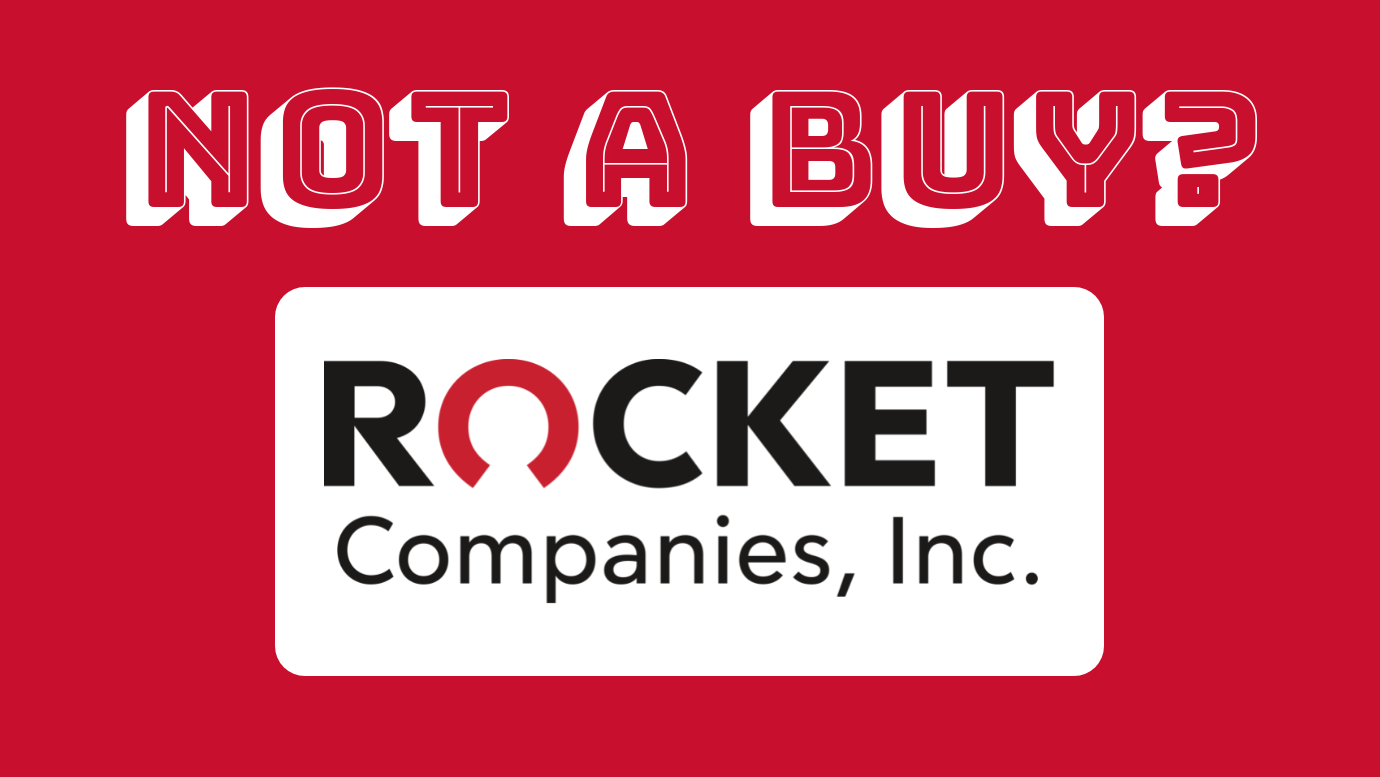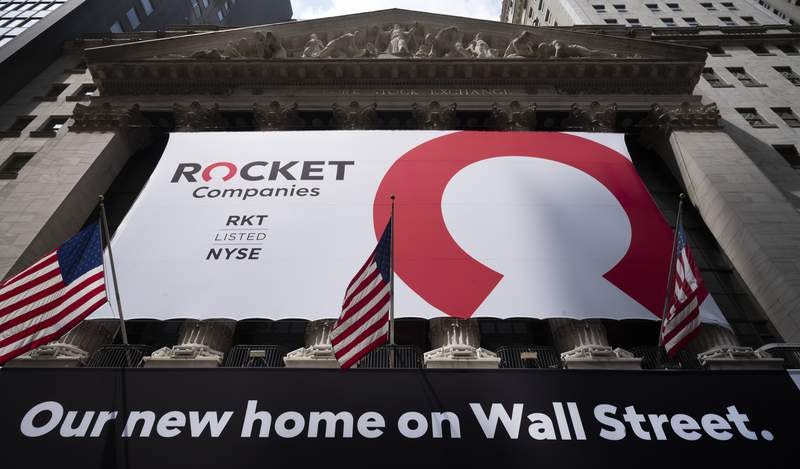RKT: Be Careful Of Complexity
A deep dive into the suspiciously confusing corporate structure behind Rocket Companies (RKT)
RKT is the stock for Rocket Companies, the holding company of several personal finance and consumer service brands including America's largest mortgage lending company, Rocket Mortgage. Rocket Mortgage is a fantastic company, having won 9 first place awards from J.D. Power for "Mortgage Origination" and "Client Service and Mortgage Servicing" and has experienced strong and consistent growth in its annual top line revenue in the last few years, with a huge 200% increase in revenue in 2020 due to low interest rates from COVID-induced economic policies.
Despite these accolades, RKT's stock has drastically underperformed the broader stock market (-25% YTD vs SPY's +18% YTD) and this article examines why.
A Rocket Companies sign is displayed on the exterior of the New York Stock Exchange, Thursday, Aug. 6, 2020, in New York. (AP Photo/Mark Lennihan) (Copyright 2020 The Associated Press. All rights reserved)
A small intro to mortgage lending
The mortgage lending space is complex and it's often hard to understand what someone is talking about with all the terminologies and jargon thrown around. Before diving into RKT, let's go over some high level concepts relevant to this article.
There are primarily two types of mortgages: home purchase mortgages and refinance mortgages. Home purchase mortgages are created when someone buys a new home, while refinance mortgages is a mortgage with different loan terms (e.g. lower interest rate) that replaces an existing mortgage.
There are also primarily two types of mortgage lenders: retail lenders and wholesale lenders. Retail lenders work directly with consumers while wholesale lenders work through third party agents.
Finally, mortgage lenders use two primary types of funding for their loans: deposit and wholesale funding. Deposit funding uses funds customers have deposited with the institution while wholesale funding uses funds from other lending sources such as Federal funds, foreign deposits, and money market funds.
Rocket Mortgage is an online retail lender relying on wholesale funding that specializes in refinancing. It's the largest overall mortgage lender in the US but lags in home purchase lending.
Rocket Mortgage is an online retail lender relying on wholesale funding that specializes in refinancing. It's the largest overall mortgage lender in the US but lags in home purchase lending. Demand for refinancing is high when interest rates fall but declines when interest rates stabilize or increase. That's why Rocket Mortgage had an outstanding 2020 when COVID forced the Federal Reserve to drastically reduce interest rates while the company's growth in 2021 has been relatively lackluster with interest rates stabilizing. This sensitivity to changing interest rates is why the company is pushing hard to diversify its revenue streams, focusing on growing its auto loans and home purchase mortgage businesses.
Good growth and finances, but...
By most measures, the market cap of RKT compared to the finances of Rocket Mortgage indicates that RKT is a cheap stock. The company has a staggering annual revenue of $15.5B and is growing at breakneck pace. Despite competing against the nation's largest banks for mortgage origination, Rocket Mortgage has and continues to rapidly gain market share. Its innovations in digitizing and bringing online the mortgage origination process combined with a deadset focus on growing market share through stellar customer experience has been key to driving growth.
So why has its stock price performed so poorly since going public? The stock debuted at $18 and reached as high as $43 before freefalling down to $15. Year-to-date, it has severely underperformed SPY and XLF (financial sector etf), having fallened almost 25% while SPY and XLF gained 18% and 33% respectively.
In fact, if you measure RKT as a growth stock, which is a very reasonable classification given its historical performance, RKT is incredibly cheap. Its price-to-sales ratio of about 2.1 is tiny compared to many popular growth stocks (e.g. PLTR's P/S ratio is 35).
What's going on?
Convoluted corporate structure
RKT's corporate structure is considered a "variable interest entity" (VIE). VIEs are complicated corporate structures where investors don't directly own the underlying company/companies but rather partake in special contracts with unique rules for ownership and profit distribution.
Sounds a bit shady? Read on and judge for yourself.
https://www.sec.gov/Archives/edgar/data/1805284/000104746920004269/g534641.jpg
Rocket Companies corporate structure diagram found in the company's form S-1
This is an official corporate structure diagram found in the company's form S-1 (registration form for new securities required by the SEC for public companies that are based in the U.S). As you can see, it's quite complicated so here's a quick summary. Based on this corporate structure, when someone buys RKT shares, they are buying ownership in a company that only has 8% economic interest and 20% voting power in Rocket Mortgage. RKT share holders are also constantly at risk of severe dilution if Dan Gilbert (cofounder and chairman of Rocket Mortgage) chooses to convert his 1.8 billion Class D shares to Class A (100 million shares in total). Conversion from Class D to Class A shares doesn't change the 8%/20% economic/voting interest arrangement for public shareholders and only serves to dilute them.
In more detail, when investors buy RKT, they are buying stock in "Rocket Companies, Inc.", an entity that only has a fixed 8% economic interest and 100% voting power for a holding company called RKT Holdings that owns the real money-making company, Rocket Mortgage. The other 92% of economic interest is owned by Dan Gilbert. In addition, even though "Rocket Companies, Inc." has full voting power over RKT Holdings, public share holders only have 20% voting power over "Rocket Companies, Inc." while Dan Gilbert owns the other 80% via his exclusive Class D shares.
RKT's VIE structure makes it incredibly difficult to realize, especially for part-time investors, that buying RKT shares means buying only 8% of economic interest and 20% of voting power of Rocket Mortgage, with Dan Gilbert owning the lion's share of profits from Rocket Mortgage and maintaining full control of the company. In addition, Dan Gilbert can choose, at any time, to dilute the public's share of this already tiny portion of economic interest and voting power by converting his large number of Class D shares to Class A shares.
That is a very bad deal.
No wonder RKT's price has drastically underperformed the broader market. To properly measure RKT's finances, one needs to reduce all of Rocket Mortgage's financial metrics to 8% of the total. So instead of a $15 billion annual revenue, it's a $1.2B annual revenue. And instead of a $600 million annual net income, it's a $48 million annual net income. These numbers pale in comparison to RKT's hefty $30 billion market cap. No wonder investors are selling.
Conclusion
RKT demonstrates that a complicated VIE structure can hide what is essentially a very bad deal. By most accounts, Rocket Mortgage is a fantastic company to invest in. However, a complicated VIE structure ensures that owning its public stock is a far cry from actually owning the company, and sets naive investors up for failure.
This is yet another great example of how, even though buying and selling stock has never been easier and more accessible to the general public, investors that don't do their homework can easily be burned.




